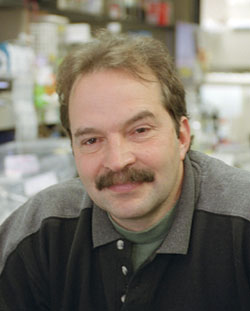Vital Signs
Randolph Noelle: Immunology insight has promising applications
A good scientist always has an eye out for counterintuitive observations. Such observations usually mean that something previously thought to be true is, in fact, incorrect. The resulting reinterpretation of the facts often leads to important scientific advances. Dartmouth immunologist Randolph Noelle, Ph.D., is a case in point.
The tale begins with a counterintuitive observation made many years ago, in the infancy of organ transplantation, when kidney transplants were almost always eventually rejected by the host. Anything that improved the success rate, even modestly, was hailed as a breakthrough.

|
|
Randy Noelle recently made a key discovery
about the immune system. |
One such discovery cut across the grain of scientific thought of the day. Noelle explains it: "If you took whole blood from the donor prior to [a kidney transplant] and transfused it into the host, it facilitated the longevity of the transplant. That observation is counterintuitive, because one would think that if you immunized the host with blood prior to the transplant, you would facilitate graft rejection. However, the procedure came to be known as donor-specific transfusion (DST), and it was widely used at the time."
Then the powerful immunosuppressive drug cyclosporin was discovered, and the field of organ transplantation was revolutionized. DST was abandoned, and it became one of those oddities of science that was never adequately explained.
Since then, knowledge of immunology has grown exponentially. It is now known, for example, that tens or even hundreds of millions of a body's cells turn over every day. The body has to have a way of recognizing the new cells as part of "self" so the immune system is not activated to attack them.
At the same time, an equal number of cells begin the process of programmed cell death known as apoptosis. During apoptosis, the immunologic makeup of cells is altered, yet the immune system still recognizes them as "self." This phenomenon is called peripheral tolerance, and these cells are presented to the immune system in a nonimmunogenic, or "negative," way. The process of reminding the immune system not to attack our own cells goes on constantly.
Host: So scientists now realize that an infusion of donor blood cells as in DST is a "negative vaccine"; the host immune system does not recognize them as foreign, so the immune response is suppressed. With the response to the donor blood suppressed, when the kidney is transplanted the immune response to it, too, is blunted. The graft lives a little longer—not much, but enough to be noticeable.
Then came the discovery of a molecule that is critical to the activation of the immune system —a helper T-cell molecule called CD154. The recent contribution made by Noelle and his graduate student Sergio Quezada was finding a way to greatly improve peripheral tolerance—using an antibody to CD154 (namely anti- CD154), which can block the function of CD154 and all but ablate immunity in the host. Even better, this immunosuppressive antibody, when given with DST, can induce a profound and long-lived unresponsiveness to just the transplantation antigens.
In other words, by itself anti- CD154 produces global immune suppression, but with DST it produces tolerance only for the transplanted organ. Further, although anti-CD154 blocks many immune responses, it spares some that are critical for protecting the body against viruses and bacteria. Moreover, this effect appears not to permanently impair the host immune system.
Skin: Noelle describes how the team demonstrated this: "We can take a white mouse and a black mouse. We can give the white mouse some black-mouse blood, together with anti- CD154, and then permanently graft a piece of black-mouse skin onto the white mouse." Skin was chosen, he says, because it is the most difficult tissue to graft due to its extreme immunogenicity. Since then, the experimental process has been extended to other species and, adds Noelle, "we are very close to clinical trials in humans."
This procedure would change the whole strategy of organ transplantation. First, the recipient would be treated with donor whole blood and anti-CD154. After as little as 24 hours, surgeons could transplant the organ without the need for immunosuppressant drug therapy.
Ironically, DST was supplanted by cyclosporin, but now DST plus anti-CD154 will likely supplant cyclosporin. In fact, the two forms of therapy are incompatible— because while cyclosporin staves off acute rejection, it blocks long-term peripheral tolerance. A new drug, rapamycin, does not have that undesirable effect. So when clinical trials are conducted, one group of patients will probably be given DST, anti-CD154, and rapamycin. Together, these treatments may result in immunologists' longtime dream: permanent graft survival without generalized immunosuppression.
And there is still more good news: anti-CD154 may also prove useful against a host of autoimmune diseases. It is already being used in a clinical trial at DHMC against multiple sclerosis. Other diseases targeted for future trials include lupus erythematosus and idiopathic thrombocytopenia. Don't tell patients with those diseases it's not worth puzzling out scientific oddities.
